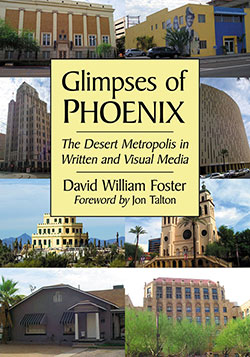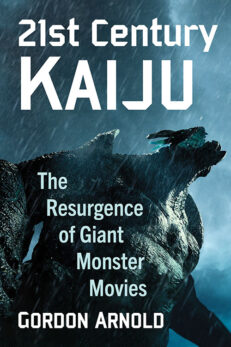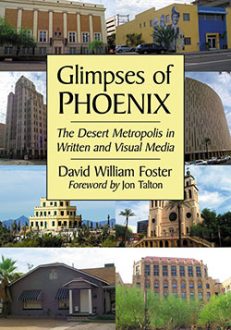Glimpses of Phoenix
The Desert Metropolis in Written and Visual Media
$39.95
In stock
About the Book
Part of the self-image of Phoenix is that the city has no history and that anything of importance happened yesterday. Also that Phoenix, the Arizona state capital, is a “clean” city (despite a past of police corruption and social oppression). The “real” Phoenix, easygoing, sun-drenched, a place of ever-expanding development and economic growth, guarantees, it is said, an enviable lifestyle, low taxes, and unfettered personal freedom and opportunity.
Little of this is true. Phoenix has been described as one of the least sustainable cities in the country. This sixth largest urban area of the United States has an alarmingly superficial and tourism-oriented discourse among its leaders. This book examines a series of narrative works (novels, theater, chronicles, investigative reporting, personal accounts, editorial cartooning, even a children’s television program) that question this discourse in a frequently stinging fashion. The works examined are anchored in a critical understanding of the dominant urban myths of Greater Phoenix, and an awareness of how all the newness, modernity and fun-in-the-sun mentality mask a uniquely dystopian human experience.
About the Author(s)
Bibliographic Details
David William Foster
Format: softcover (6 x 9)
Pages: 208
Bibliographic Info: 26 photos, appendices, notes, bibliography, index
Copyright Date: 2013
pISBN: 978-0-7864-7364-9
eISBN: 978-1-4766-0221-9
Imprint: McFarland
Table of Contents
Table of Contents
Foreword: Writing Phoenix, by Jon Talton 1
Introduction 9
Erma Bombeck: The Phoenix Suburban Underbelly 23
Wallace and Ladmo: Dark Shadows of Irreverent Humor in the Valley of the Sun 35
Truthful Misrepresentations: Steve Benson Draws Phoenix 48
Phoenix, Say What? Urban Landscapes in the Chronicles of Laurie Notaro 64
Desert Noir: The Detective Novels of Jon Talton 78
Jana Bommersbach on Winnie Ruth Judd: Woman as Scapegoat for the Dirty Secrets of the City 91
Out of the Barrio: Stella Pope Duarte’s Let Their Spirits Dance 104
Phoenix in Guillermo Reyes’s Places to Touch Him 121
Phoenix as Dystopia in Cherríe Moraga’s Hungry Woman 134
Cecilia Esquer: Establishing a Public Voice for a Chicana Activist 151
Conclusions 160
Appendix I: Glendon Swarthout and The Cadillac Cowboys 169
Appendix II: The Matter of Jack Swilling 173
Chapter Notes 177
References 192
Index 199





